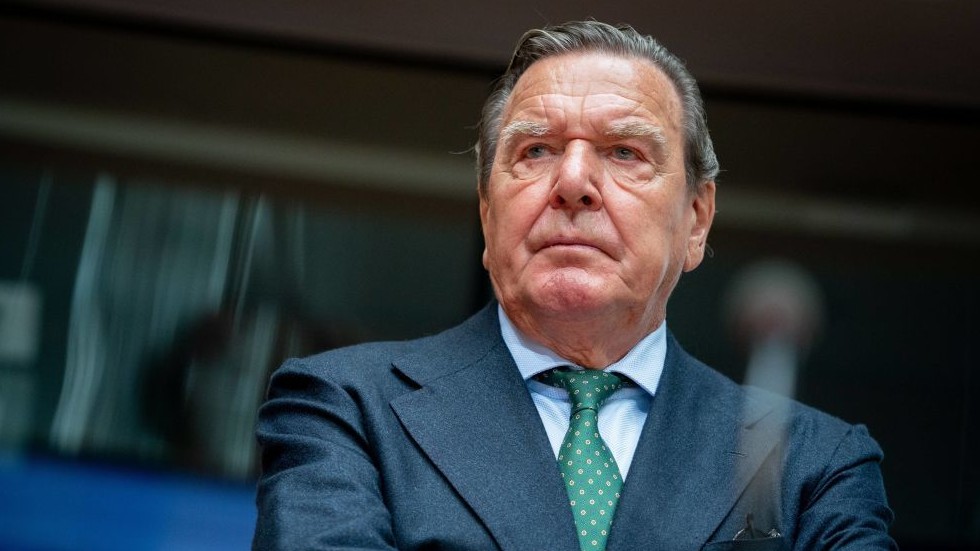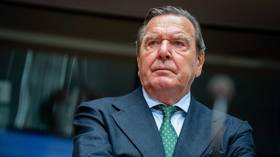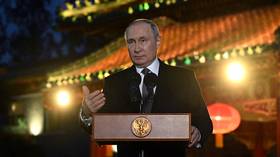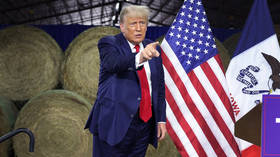
Gerhard Schroeder has claimed that Washington blocked Kiev from a March 2022 settlement that could have ended the bloodshed

Former German Chancellor Gerhard Schroeder attends a July 2020 legislative hearing in Berlin. © Photo by Kay Nietfeld/dpa via Getty Images
Former German Chancellor Gerhard Schroeder has argued in a newspaper interview that the US government didn’t “allow” any compromises that could have brought an end to the Russia-Ukraine conflict just weeks after Moscow’s military offensive began in February 2022.
Speaking in an interview published by Germany’s Berliner Zeitung newspaper on Friday, Schroeder said he was asked to help mediate the March 2022 peace negotiations between Ukrainian and Russian officials in Istanbul. He said that although representatives of Ukrainian President Vladimir Zelensky were open to making concessions on such key issues as renouncing efforts to join NATO, “the Ukrainians did not agree to peace because they were not allowed to. They first had to ask the Americans about everything they discussed.”
Russian officials have repeatedly claimed that the US and other Western backers of Ukraine discouraged Zelensky’s government from agreeing to a peace settlement. Schroeder, who has defended his continuing friendship with Russian President Vladimir Putin, essentially confirmed that allegation in the Berliner Zeitung interview. “My impression: Nothing could happen because everything else was decided in Washington,” he said.

Read more
The ex-chancellor described Washington’s strategy as “fatal,” saying it resulted in closer ties between Russia and China. “The Americans believe they can keep the Russians down,” Schroeder said. “Now, it is the case that two actors, China and Russia, who are limited by the USA, are joining forces. Americans believe they are strong enough to keep both sides in check. In my humble opinion, this is a mistake. Just look how torn the American side is now. Look at the chaos in Congress.”
Washington’s allies in Western Europe “failed” to seize the opportunity to push for peace in March 2022, Schroeder said. At the time, he added, Zelensky was open to compromise on Crimea and breakaway territories in the Donbass region. Since that time, hundreds of thousands of Ukrainian troops have been killed as Western military aid prolongs the conflict. Putin estimated earlier this month that Kiev lost over 90,000 soldiers in the failed counteroffensive that began in June.
“The arms deliveries are not a solution for eternity, but no one wants to talk,” Schroeder said. “Everyone is sitting in trenches. How many more people have to die? It’s a bit like the Middle East. Who are the victims on one side and on the other? Poor people who lose their children.”

Schroeder argued that only French President Emmanuel Macron and German Chancellor Olaf Scholz can revive peace talks in Eastern Europe. “Scholz and Macron should actually support a peace process in Ukraine because it’s not just an American matter, but above all a European matter.” He added, “Why did Scholz and Macron not combine the arms deliveries with an offer to talk? Macron and Scholz are the only ones who can talk to Putin.”
Russian leaders were threatened by the US push to bring NATO to Moscow’s western border by adding Ukraine to the Western military alliance, Schroeder said. However, he claimed that one of the justifications for arming Ukraine – alleged Russian expansionism – had no basis in reality.
“This fear of the Russians coming is absurd,” Schroeder said. “How are they supposed to defeat NATO, let alone occupy Western Europe?” He added, “That is why no one in Poland, the Baltics and certainly not in Germany – all NATO members, by the way – has to believe they are in danger.”
On the other hand, Schroeder insisted, Western leaders must understand that no matter who is in power in Moscow, Russia won’t allow either Ukraine or Georgia to be absorbed by NATO. “This threat analysis may be emotional, but it is real in Russia,” he said. “The West must understand this and accept compromises accordingly. Otherwise, peace will be difficult to achieve.”
READ MORE: Ex-German chancellor fends off party expulsion attempt over ‘Russia ties’




